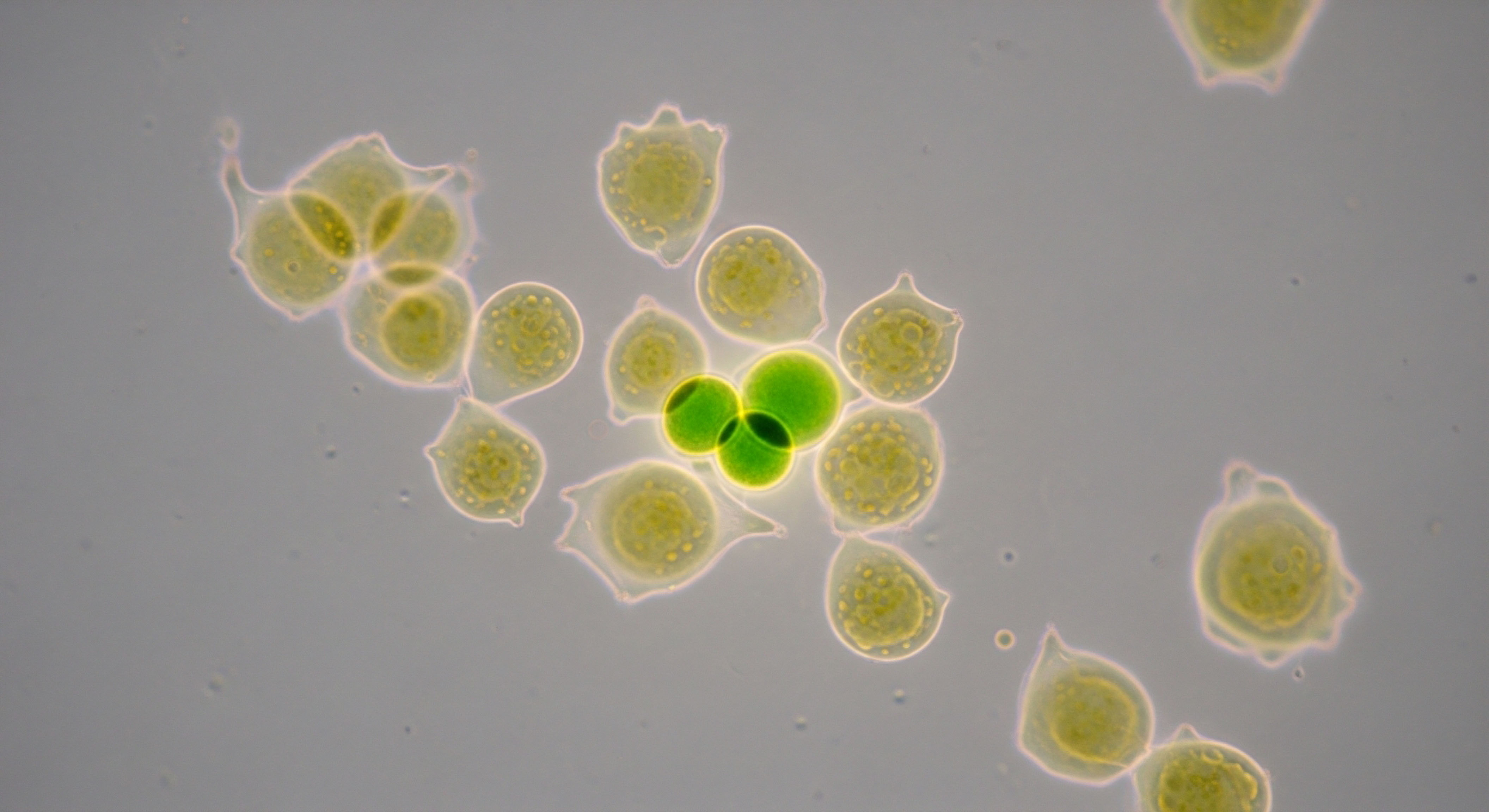

Fundamentals
You may have noticed a subtle shift in your mental landscape. The name on the tip of your tongue vanishes, the solution to a problem feels just out of reach, or the once-clear map of your own city streets feels suddenly unfamiliar.
These moments of cognitive friction are a deeply personal experience, often dismissed as an inevitable consequence of aging or stress. The feeling is one of a system that is still functional, but operating with a degree of static or interference that was not there before.
This experience is valid, and it points toward the intricate, silent biological symphony that governs our mental clarity. The conductor of this symphony, particularly in men, is often testosterone. Its role extends far beyond muscle and libido; it is a fundamental signaling molecule within the brain, shaping the very architecture of your thoughts.
Understanding the cognitive benefits of testosterone optimization begins with appreciating its role as a neurosteroid. Testosterone receptors are not confined to the reproductive system; they are found in critical areas of the brain responsible for memory, attention, and higher-order reasoning.
When testosterone levels are optimal, these brain regions receive the consistent biochemical signals they require to function efficiently. This is the biological reality behind the feeling of mental sharpness and focus. The hormone facilitates the health and maintenance of neurons, the brain’s communication wires, and supports synaptic plasticity, which is the physical basis of learning and memory formation.
A decline in this essential hormone can, therefore, manifest as a tangible decline in cognitive performance, from memory recall to the ability to concentrate on complex tasks.
Restoring testosterone to its optimal range provides the brain with the necessary biochemical support for enhanced neural communication and cognitive processing.
The experience of “brain fog” is a common complaint among men with suboptimal testosterone levels. This sensation of mental haze and reduced clarity has a physiological basis. Testosterone modulates the activity of key neurotransmitters, including dopamine, which is central to motivation, focus, and executive function.
When testosterone is insufficient, dopamine signaling can become dysregulated, contributing to that feeling of being mentally stuck or unable to engage with tasks demanding sustained concentration. Optimizing testosterone levels can help restore this delicate neurochemical balance, leading to improved mental clarity, more effective problem-solving, and a renewed capacity for focused work.
This is not about creating a new capability, but about restoring the brain’s inherent potential for clear and efficient thought by ensuring it has the hormonal resources it needs.
Furthermore, the connection between testosterone and mood is inseparable from cognitive function. Low testosterone is frequently associated with symptoms of irritability and low mood, which directly impact cognitive resources. When the brain is burdened by a depressive state, cognitive functions like memory and executive control are compromised.
Hormonal optimization can alleviate these mood-related symptoms, thereby freeing up mental energy for higher-level cognitive processes. This integrated effect on mood and cognition underscores the hormone’s systemic influence on a man’s overall sense of well-being and mental function. The journey to understanding your own cognitive landscape is a journey into your own unique physiology, where hormonal balance is a key determinant of mental vitality.


Intermediate
To appreciate how hormonal optimization translates into tangible cognitive improvements, we must examine the specific clinical protocols and the mechanisms through which they operate. Testosterone Replacement Therapy (TRT) for men is a precise medical intervention designed to restore circulating testosterone to a healthy, youthful range.
The standard protocol often involves weekly intramuscular injections of Testosterone Cypionate, a bioidentical form of the hormone. This method ensures stable and predictable serum levels, avoiding the significant peaks and troughs that can occur with other delivery systems. This stability is itself a crucial factor for cognitive function, as the brain thrives on consistency. Fluctuating hormonal signals can create their own form of neurological noise, whereas a steady state supports consistent neurotransmitter function and neural signaling.
A critical component of a sophisticated TRT protocol is the management of downstream hormonal metabolites. As testosterone is administered, the body naturally attempts to maintain homeostasis through two primary conversion pathways. The enzyme aromatase converts a portion of testosterone into estradiol, the primary estrogen, while the enzyme 5-alpha reductase converts some into dihydrotestosterone (DHT).
While both metabolites have biological roles, excessive conversion to estradiol can lead to side effects and may interfere with some of testosterone’s cognitive benefits. To manage this, a carefully dosed Aromatase Inhibitor (AI), such as Anastrozole, is often included in the protocol. Anastrozole selectively blocks the aromatase enzyme, preventing the overproduction of estradiol and maintaining a favorable testosterone-to-estrogen ratio, which is vital for both cognitive and overall physiological health.

Preserving Endogenous Function and System Balance
A well-designed TRT protocol does more than just supply exogenous testosterone; it seeks to support the entire endocrine system. The introduction of external testosterone can signal the Hypothalamic-Pituitary-Gonadal (HPG) axis to downregulate its own production.
The hypothalamus reduces its secretion of Gonadotropin-Releasing Hormone (GnRH), which in turn leads the pituitary gland to produce less Luteinizing Hormone (LH) and Follicle-Stimulating Hormone (FSH). LH is the direct signal for the testes to produce testosterone. To counteract this suppressive effect, protocols frequently include a GnRH analogue like Gonadorelin.
Administered via subcutaneous injection, Gonadorelin mimics the body’s natural GnRH pulses, stimulating the pituitary to continue producing LH and FSH. This maintains testicular function and preserves a level of natural testosterone production, creating a more balanced and resilient endocrine environment. For some patients, Enclomiphene may be used as an alternative or adjunct therapy to directly support LH and FSH levels.
Effective testosterone optimization involves a multi-faceted protocol that manages hormonal conversion and supports the body’s natural endocrine feedback loops.
The table below outlines a standard TRT protocol, illustrating how each component contributes to the overall goal of safe and effective hormonal recalibration. This systematic approach highlights the clinical thought process, which moves beyond simple hormone replacement to a comprehensive management of the entire endocrine axis.
| Medication | Typical Administration | Primary Purpose in Protocol |
|---|---|---|
| Testosterone Cypionate | Weekly Intramuscular Injection | Primary androgen replacement to restore serum testosterone to optimal levels. |
| Gonadorelin | 2x/week Subcutaneous Injection | Maintains natural testicular function and fertility by stimulating LH/FSH production. |
| Anastrozole | 2x/week Oral Tablet | Blocks the conversion of testosterone to estrogen, managing side effects. |
| Enclomiphene | Oral Tablet (as needed) | Supports LH and FSH levels to enhance endogenous testosterone production. |
This integrated strategy ensures that the cognitive benefits, such as improved focus, memory, and problem-solving skills, are achieved within a framework of systemic health. By addressing the primary hormone level, managing its conversion, and supporting the body’s intrinsic production pathways, the protocol creates a stable and optimized neuro-endocrine environment conducive to peak cognitive performance.


Academic
A deep analysis of testosterone’s cognitive effects requires moving beyond its role as a simple androgen and examining its function as a complex neuromodulator operating through multiple, interconnected pathways. The cognitive enhancements observed during optimization therapy are the macroscopic result of microscopic actions at the cellular and synaptic levels, particularly within the hippocampus and prefrontal cortex.
These brain regions, critical for memory consolidation and executive function respectively, are densely populated with androgen receptors (ARs) and are also sites of local steroidogenesis, capable of synthesizing neurosteroids de novo. Testosterone’s influence is mediated through both classical genomic mechanisms and rapid non-genomic actions, creating a multifaceted impact on neuronal architecture and function.
The genomic pathway involves testosterone binding to intracellular ARs. This hormone-receptor complex then translocates to the nucleus, where it acts as a transcription factor, binding to hormone response elements on DNA to upregulate or downregulate the expression of specific genes.
This process influences the synthesis of proteins crucial for neuronal survival, synaptic plasticity, and resilience against neurotoxic insults. For instance, testosterone has been shown to increase the expression of brain-derived neurotrophic factor (BDNF), a key molecule involved in neurogenesis, synaptogenesis, and long-term potentiation (LTP), the molecular basis of memory formation.
Concurrently, non-genomic actions occur at the cell membrane, where testosterone can rapidly modulate ion channel activity and second messenger systems, altering neuronal excitability and neurotransmitter release within milliseconds to seconds. This dual-speed action allows testosterone to provide both long-term structural support and immediate functional modulation to neural circuits.

The Interplay of Testosterone and Neurotransmitter Systems
A significant portion of testosterone’s cognitive impact stems from its modulation of key neurotransmitter systems, especially the dopaminergic system. Dopamine is integral to executive functions, including working memory, cognitive flexibility, and attentional control. Testosterone appears to potentiate dopamine synthesis and release in pathways projecting to the prefrontal cortex.
It can influence the activity of tyrosine hydroxylase, the rate-limiting enzyme in dopamine production, and modulate the density and sensitivity of dopamine receptors. This relationship helps explain the improvements in focus, motivation, and problem-solving abilities reported in clinical settings. Optimal testosterone levels create a neurochemical environment where dopamine signaling is efficient, facilitating the brain’s ability to filter distractions and sustain goal-directed cognitive effort.
What are the long-term neurological implications of sustained testosterone optimization? The evidence increasingly points towards a neuroprotective role. Age-related cognitive decline and the risk of neurodegenerative diseases like Alzheimer’s are associated with falling testosterone levels. Mechanistically, testosterone has been shown in preclinical models to reduce the production and accumulation of amyloid-beta plaques, a primary pathological hallmark of Alzheimer’s disease.
It appears to achieve this by modulating the enzymatic cleavage of amyloid precursor protein (APP) away from the amyloidogenic pathway. Furthermore, testosterone’s anti-inflammatory and antioxidant properties within the central nervous system help protect neurons from oxidative stress and excitotoxicity, two common pathways of neuronal death in aging and disease.
Testosterone’s cognitive benefits are the result of its integrated genomic and non-genomic actions that enhance synaptic plasticity, modulate neurotransmitter systems, and confer neuroprotection.
The following table details the distinct yet complementary mechanisms through which testosterone impacts cognitive architecture, illustrating the depth of its influence on brain health.
| Mechanism | Cellular/Molecular Effect | Resulting Cognitive Benefit |
|---|---|---|
| Genomic Action (via AR) | Modulates gene transcription; increases BDNF expression. | Enhanced long-term potentiation, memory formation, and neuronal resilience. |
| Non-Genomic Action | Rapid modulation of ion channels and second messengers. | Immediate effects on neuronal excitability and synaptic transmission. |
| Dopamine System Modulation | Increases dopamine synthesis, release, and receptor sensitivity. | Improved executive function, focus, and cognitive flexibility. |
| Neuroprotection | Reduces amyloid-beta accumulation and oxidative stress. | Potential mitigation of age-related cognitive decline and neurodegeneration. |
This systems-biology perspective reveals that testosterone optimization is a powerful intervention that recalibrates the brain’s biochemical environment. It supports the very foundation of cognitive processing, from the structural integrity of neurons to the efficiency of the neurotransmitter systems that drive thought, memory, and executive control. The resulting cognitive benefits are a direct reflection of a nervous system functioning in a state of hormonal and neurochemical equilibrium.

References
- Cherrier, M. M. Asthana, S. Plymate, S. Baker, L. Matsumoto, A. M. Peskind, E. Raskind, M. A. Brodkin, K. Bremner, W. Petrova, A. LaTendresse, S. & Craft, S. (2001). Testosterone supplementation improves spatial and verbal memory in healthy older men. Neurology, 57(1), 80 ∞ 88.
- Goucha, R. & Mokni, M. (2018). Executive functions are related to serum testosterone and basal metabolism rate fluctuation but not lymphocyte dopamine receptor. Physiology and Pharmacology, 22(1), 1-10.
- Janowsky, J. S. Oviatt, S. K. & Orwoll, E. S. (1994). Testosterone influences spatial cognition in older men. Behavioral Neuroscience, 108(2), 325 ∞ 332.
- Pikula, A. & Kuca, K. (2013). The Effect of Testosterone on the Formation of Brain Structures. Developmental Neuroscience, 35(1), 1-10.
- Resnick, S. M. Matsumoto, A. M. Stephens-Shields, A. J. Ellenberg, S. S. Gill, T. M. Shumaker, S. A. & Snyder, P. J. (2017). Testosterone treatment and cognitive function in older men with low testosterone and age-associated memory impairment. JAMA, 317(7), 717-727.
- Rosario, E. R. & Cherrier, M. M. (2017). Testosterone and cognitive health in aging men. Endocrinology and Metabolism Clinics, 46(3), 695-707.
- Salmin, V. V. Morgun, A. V. Kuvacheva, N. V. & Taranushenko, T. E. (2016). On the effects of testosterone on brain behavioral functions. Acta Physiologica, 218, 20-29.
- Swerdloff, R. S. Wang, C. & Bhasin, S. (2017). Testosterone and the brain. In Testosterone (pp. 165-174). Oxford University Press.
- Thilers, P. P. MacDonald, S. W. & Herlitz, A. (2006). The association between endogenous testosterone and cognitive performance ∞ a population-based study in 35 to 90 year-old men and women. Psychoneuroendocrinology, 31(5), 565-576.
- Zitzmann, M. (2006). Testosterone and the brain. Aging Male, 9(4), 195-199.

Reflection

Your Personal Cognitive Blueprint
The information presented here provides a map of the biological territories that govern your mental clarity. It connects the subjective feelings of cognitive static to the objective, measurable world of endocrinology and neuroscience. This knowledge is the first, essential step. It transforms abstract concerns into a concrete understanding of the systems at play within your own body.
The path forward involves seeing this information not as a conclusion, but as a lens through which to view your own unique health profile. Your symptoms, your lab results, and your personal goals form a unique blueprint.
Understanding the principles of hormonal optimization allows you to read that blueprint with newfound clarity, empowering you to ask targeted questions and seek a personalized strategy that restores your system to its intended state of vitality and function. The ultimate goal is to reclaim the cognitive sharpness that is integral to who you are.



